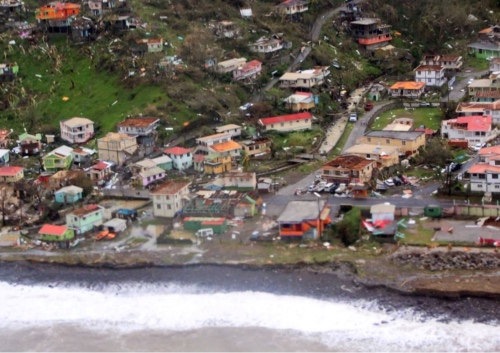
Damaged homes from Hurricane Maria are shown in this aerial photograph taken over the island of Dominica on 19th September, 2017. PICTURE: Courtesy Nigel R Browne/Caribbean Disaster Emergency Management Agency/Regional Security System.
The Caribbean island of Dominica, still reeling from Hurricane Maria last September, is on the “frontline of the war on climate change” and has only five months to prepare for the next hurricane season, its foreign minister said.
“Time is not on our side,” Francine Baron told an event in London, adding that the tiny island nation of 71,000 people is taking steps to “build back better” after last year’s disaster.
The top-strength storm killed at least 14 in Dominica, and caused damage worth $US931 million, according to a government report.
“No part of the island was spared – every single sector and every single family was negatively affected by this hurricane,” Ms Baron told Tuesday’s discussion on the Caribbean region’s resilience to disasters.
Dominica’s recovery effort will cost $US1.37 billion, the same report found, equal to 226 per cent of its 2016 GDP.
Prime Minister Roosevelt Skerrit has vowed to make his country the first “climate-resilient nation”, which Ms Baron said was a “serious vision” that would involve practical steps.
Those could include relocating whole communities from vulnerable areas, and developing geothermal energy, Ms Baron said. So far, electricity has been restored to only 10 per cent of customers, she added.
Dominica has 365 rivers – one for each day of the year, quipped Ms Baron – which along with its mountainous topography make it prone to flooding and landslides.
Building back better will require stronger flood defences and construction guidelines, making use of risk data, and fortifying existing structures such as raising bridges.
During the hurricane many people sought shelter in schools and churches, which were not built to double up as emergency shelters.
The country will invest in new purpose-built shelters stocked with supplies and run by managers to prepare for the next crisis, Baron said.
Dominica’s shipping port, which had to handle a major influx of international aid after the disaster, will also be expanded.
The government will hold a public consultation to develop a national resilience plan, and set up an emergency relief fund and a national disaster committee, the foreign minister said.
None of these plans will come cheap.
Small economies like tourism-reliant Dominica and others in the Caribbean are struggling to access funding for climate change measures, Ms Baron said.
The region needs about $US8 billion to roll out national plans under the 2015 Paris Agreement to tackle global warming, experts say.
At a November donor conference hosted by the United Nations and CARICOM, the Caribbean’s largest cooperation group, countries promised $US1.3 billion in aid and more than $US1 billion in loans and debt relief to help the Caribbean recover from two major hurricanes.
The Climate Finance Access Hub, managed by the 52-nation Commonwealth, enables countries to unlock funding to reduce the risk of disasters, said Patricia Scotland, the Commonwealth secretary-general.
“I hardly recognised the land of my birth,” she said of her native Dominica, calling herself “a daughter of the Caribbean”.
Ms Scotland said climate-related disasters had become an “existential” threat to communities, and were undoing development in small islands like Dominica.
“For all of those who thought for years… we were crying wolf (about climate change), well we’ve just been eaten, because the wolf is really here,” said Ms Scotland, referring to a well-known fairytale.
In April, London will host the Commonwealth Heads of Government Meeting where economic and social resilience will be on the agenda, said Ms Scotland.
Ronald Jackson of the Caribbean Disaster Emergency Management Agency said small island states need to share knowledge if they are to build back better after disasters.
Communities must also be included in resilience efforts and given incentives to comply with measures to protect them, he told the audience at the Overseas Development Institute.
Mr Jackson urged Dominica and other countries vulnerable to climate change to use laws already on the books and improve the infrastructure they have now.






